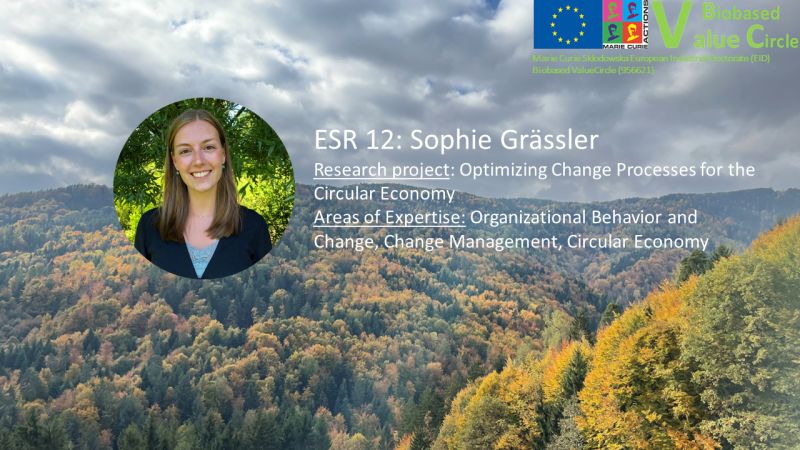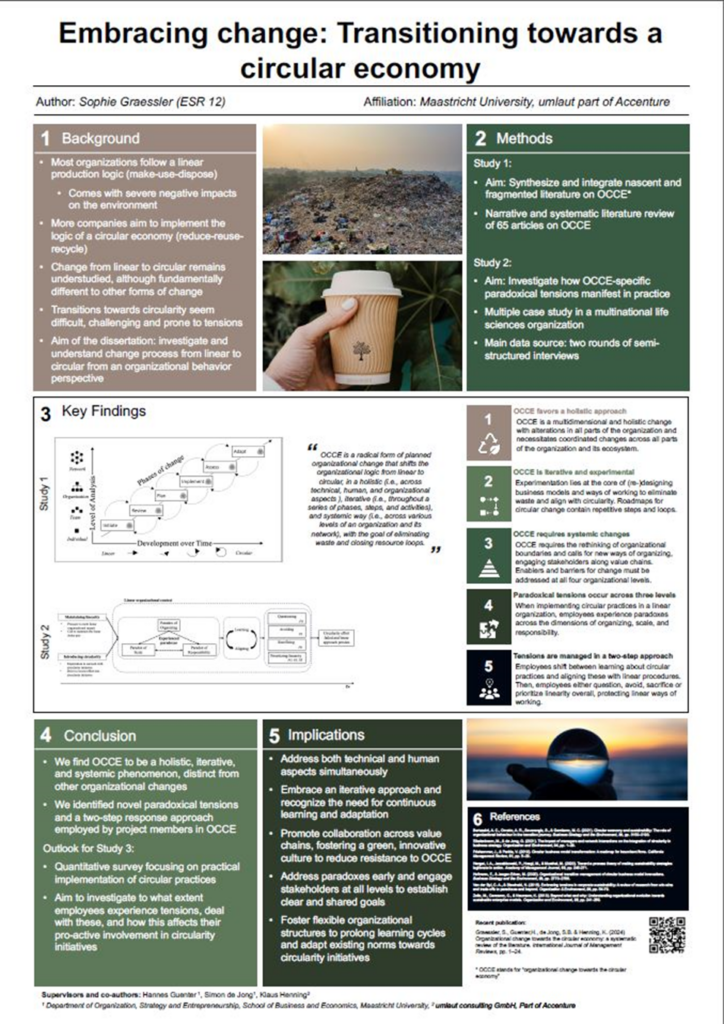
Abstract
In recent years, interest among practitioners and academics has grown in how businesses can become more sustainable through the implementation of a more circular economy, which focuses on reducing waste and reusing materials. In two projects we reviewed existing research on OCCE (i.e., “Organizational Change towards a Circular Economy”) and analyzed five change projects in a multinational company to understand this transition and its tensions better. In our systematic literature review, analyzing 65 articles, we found areas of agreement, uncertainty, and differences among studies. We offer a new, comprehensive view of OCCE and define it according to the dimensions of content, process, and context of change. We also identify future research opportunities. When analyzing five change projects in a multiple case study, we found three main challenges: balancing new sustainable practices and procedures with existing ones, scaling up these practices while staying (cost-) efficient, and managing conflicting own and shared responsibilities. Project teams initially tried to attend to both old and new practices but often had to choose linear practices over circular ones. Strategies included questioning the tensions, avoiding the challenges, compromising or sacrificing on circular features, or sticking with traditional linear organizational methods. Our findings offer a clear guide for businesses to adopt circular practices more effectively. This, in turn, may assist companies develop better sustainability strategies, aimed at the circular economy, that benefit both their operations and the environment.
Publications for Communication and Dissemination
Published:
Graessler, S., Guenter,H., de Jong, S.B. & Henning, K. (2024). Organizational change towards the circular economy: a systematic review of the literature. International Journal of Management Reviews, 1–24.https://doi.org/10.1111/ijmr.12367
Working paper:
Graessler, S., Guenter, H., De Jong, S., & Henning, K. (Working paper). Going circular in a linear business environment: Squaring the circle?
The literature review (paper 1) was presented at the Academy of Management Conference (https://aom.org/events/annual-meeting) and at the Green Human Resource Conference (https://www.wu.ac.at/en/persm/green-hrm/konferenz-2022) and is published now in the International Journal of Management Reviews. A short version (10 pages) of the case study (paper 2) was presented at the 39th EGOS Colloquium (https://www.egos.org/2023_Cagliari/General-Theme) in July 2023. In addition, the case study will be presented at the Academy of Management Conference in August 2024 (https://aom.org/events/annual-meeting/future-annual-meetings/2024-innovating-for-the-future-policy-purpose-and-organizations). We will submit the case study to an academic journal later in 2024. I have also presented the (preliminary) results of both papers several times during the BBVC trainings, as well as internally at umlaut / Accenture and within SBE in Maastricht.
| Action plans | Target actors/audience | Means | Timing |
| Training events Biobased Value Circle #3 in Netherlands | Other ESRs and supervisors within the consortium | Presenting | May, 2022 |
| Training events Biobased Value Circle #4 in Cologne | Other ESRs and supervisors within the consortium | Presenting | November, 2022 |
| Training events Biobased Value Circle #5 in Graz | Other ESRs and supervisors within the consortium | Presenting | May, 2023 |
| LinkedIn Biobased Value Circle | Academic/Industry and general public; wide range of professionals | Promotion | Throughout 2023 |
| Green HRM Conference | Green HRM scholars, organizational scholars with an interest in sustainability | Presenting | March, 2022 |
| AOM Conference | Organizational behavior and change management scholars | Presenting | August, 2022 |
| Presentation at EGOS Colloquium | Organizational behavior and change management scholars, scholars with an interest in the circular economy | Presenting | July, 2023 |
| OSE Brownbag Seminars | Organizational scholars within the department at SBE | Presenting | Fall, 2023 |
| Internal trainings, meetings, and presentations within umlaut/Accenture | Other management consultants, that could use the insights for future client projects | Presenting | June, 2022, May, 2023 and further throughout the years |
| White paper, pitchdecks, and client work in general at umlaut/Accenture | Clients of other management consultants that aim to change towards the circular economy | Presenting, making & distributing documents | Throughout 2022 and 2023 |
| Detailed synthesis of case study results | The company I am conducting the case study with | Presenting, making & distributing documents | Summer / Fall, 2023 |
| Training events Biobased Value Circle #6 in Galway | Other ESRs and supervisors within the consortium | Presenting | November, 2023 |
| Final Biobased Value Circle Symposium in Geleen | Other ESRs and supervisors within the consortium; broader public audience consisting of academic and industrial actors interested in biobased value circle | Presenting and Promotion | May, 2024 |
Protection of the acquired intellectual property (patents applications) etc.
No potential intellectual property was identified.
Impact on science and/or technology
The research results obtained until April 2024 contribute to the state of the art in science in several ways. First, paper 1 synthesized the currently fragmented literature on organizational change towards the circular economy. We identified consensus, unclarities, and differences in the OCCE literature and also conceptualized OCCE more systematically, while identifying shortcomings and opportunities for future research and providing practical insights for managers. Second, the first round of data collection for paper 2 reveals three dimensions of paradoxical tensions in circular economy change initiatives, contributing to the literature on tensions in organizational change, as well as the wider paradox literature, whereas the second round identifies managing strategies of these tensions. We also identify concrete implications for practitioners and avenues for future research, which hopefully can serve as a starting point for more research how to accelerate the change towards a more circular and sustainable future. Organizational scholars could benefit from the results of the papers so far, for example by acting upon our suggested areas for future research or also referring to our conceptualization of OCCE in paper 1. These scholars could be active in various fields that fall under the organizational behavior umbrella, including human resources, change management, organizational change, planned organizational change, green human resource management, sustainable organizational change, and organizational change towards the circular economy.
Our research results to date also contribute to the technologies, tools and frameworks currently used in organizational change processes. For example, in paper 1 we identified several enablers and barriers of circular economy change projects, across various organizational levels. Companies could, for example, develop a benchmarking tool based on our list of enablers and mirror a current circular economy project against them. In doing so, companies could see, for example, whether teams are operating autonomously enough or whether they should implement more internal circular economy trainings first to educate employees, before further pursuing the change. The six-step change framework that we developed in paper 1 can also be used by organizations as a possible guideline to follow when changing towards a circular economy. Also, the tensions identified in paper 2 can be used as a basis for a checklist for companies to screen circular economy projects and recognize possible tensions early on.
Impact on innovation (companies)
On the one hand, consulting companies might be interested in assisting their clients in changing from a linear towards a more circular economy. On the other hand, production and manufacturing companies might be interested in the research results, especially when switching from a rather linear way of working towards a more circular logic. These companies might specifically benefit from the research results, for example by following the six-step change process developed in paper 1 or being aware of possible paradoxical tensions that could hinder the success of such change initiatives. As such, not only consultancies, but also their clients, can benefit from the research results. Also other scholars outside the consortium might use results as a starting point to further investigate the phenomenon of organizational change towards the circular economy.
Impact on society
Society and the general public might benefit from the research results in several ways. The topic of the circular economy addresses one of society’s greatest challenges these days, that is, climate change. Companies can contribute towards sustainability by implementing circular economy principles, such as reduce, reuse, or recycle or moving towards entirely circular business models. The research of this PhD project might assist companies in implementing such circular business models via a suitable change management approach, which can then also assist in the fight of climate change in society on a larger scale. In addition, many employees, particularly in the manufacturing industry, are directly or indirectly involved in such change initiatives towards a circular economy, for example by being tasked with designing more circular packaging or leading a circular economy marketing campaign in their daily jobs. Especially for these employees it might be of interest to follow a suitable change management approach towards the circular economy and be aware of the possible tensions that they might face during this process.
Visual Summary – Poster

